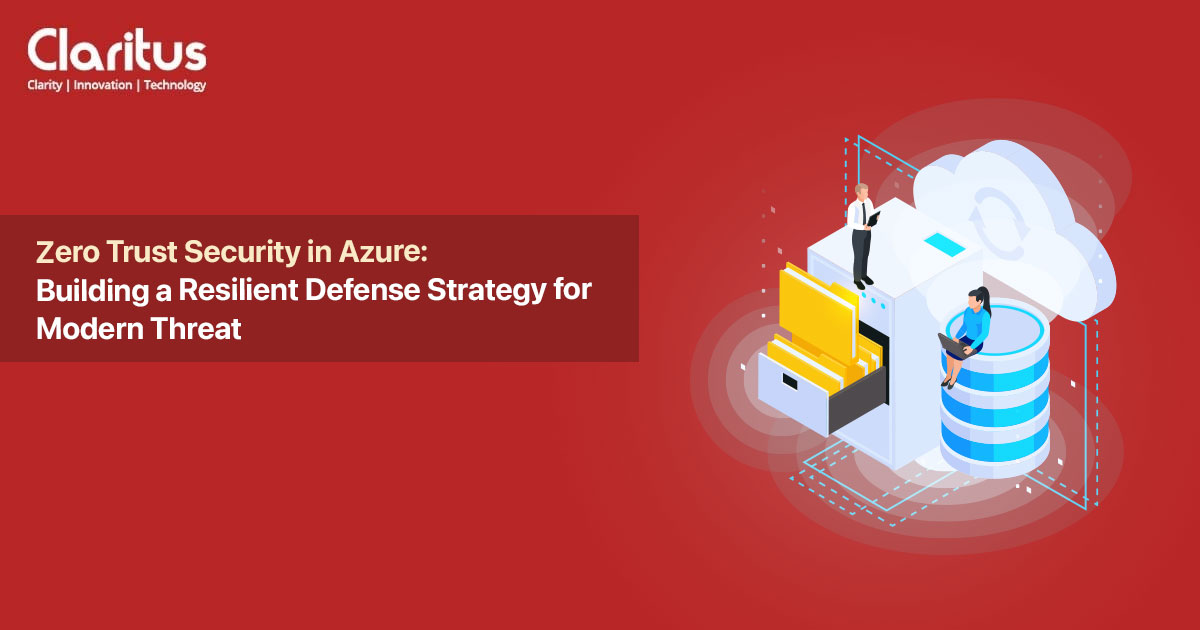Zero Trust Security in Azure: Fortifying Your Defenses Against Modern Threats

In today’s digital topography, cybersecurity has become a paramount concern for organizations of all sizes. With the proliferation of sophisticated cyber threats and the increasing complexity of IT environments, traditional security approaches are no longer sufficient to protect sensitive data and critical assets. Enter Zero Trust Security: a revolutionary paradigm that challenges the conventional notion of trust and emphasizes a proactive, defense-in-depth strategy to safeguard against modern threats. In this blog, we’ll explore how Zero Trust Security in Azure enables organizations to build a resilient defense strategy and mitigate the risks posed by evolving cyber threats.
Zero Trust Security: Redefining Trust in the Digital Age
At its core, Zero Trust Security operates on the principle of “never trust, always verify.” Unlike traditional perimeter-based security models that rely on implicit trust, Zero Trust Security assumes that threats can originate from both inside and outside the network. As such, every user, device, and application must undergo continuous verification and validation before gaining access to sensitive resources. By eliminating the concept of implicit trust, Zero Trust Security minimizes the attack surface and enhances overall security posture, even in dynamic and distributed environments.
Azure: The Foundation of Zero Trust Security
Within the Azure ecosystem, Zero Trust Security is not just a concept—it’s a foundational principle embedded into the fabric of Azure’s architecture and services. Leveraging a combination of advanced technologies such as identity and access management, encryption, threat intelligence, and behavioral analytics, Azure enables organizations to implement a comprehensive Zero Trust Security framework tailored to their unique requirements.
Identity-Centric Security: The First Line of Defense
At the heart of Zero Trust Security in Azure lies identity-centric security. By verifying the identity of users and devices before granting access to resources, organizations can prevent unauthorized access and mitigate the risk of credential theft and misuse. Azure Active Directory (AAD) serves as the cornerstone of identity management in Azure, providing robust authentication and authorization capabilities, single sign-on (SSO) functionality, and seamless integration with third-party identity providers. With features such as Multi-Factor Authentication (MFA), Conditional Access, and Privileged Identity Management (PIM), Azure empowers organizations to enforce granular access controls and strengthen their defense against unauthorized access attempts.
Data Encryption: Safeguarding Data at Rest and in Transit
In addition to identity-centric security, data encryption plays a critical role in Zero Trust Security by protecting sensitive data from unauthorized access and interception. Azure offers a comprehensive suite of encryption services, including Azure Disk Encryption, Azure Storage Encryption, and Azure Information Protection, enabling organizations to encrypt data at rest and in transit across the entire data lifecycle. By encrypting data using industry-standard algorithms and cryptographic protocols, Azure ensures confidentiality, integrity, and availability, even in the event of a security breach or data exfiltration attempt.
Threat Intelligence: Proactive Detection and Response
In the ever-evolving threat landscape, proactive threat detection and response are essential components of a Zero Trust Security strategy. Azure Security Center leverages advanced threat intelligence and machine learning capabilities to identify suspicious activities, detect emerging threats, and respond to security incidents in real time. By continuously monitoring and analyzing telemetry data from across the Azure environment, Security Center provides organizations with actionable insights and recommendations to strengthen their security posture and mitigate potential risks.
Behavioral Analytics: Identifying Anomalies and Abnormalities
Traditional security approaches rely on static rules and signatures to detect threats, which can be easily evaded by sophisticated adversaries. In contrast, behavioral analytics leverages machine learning and artificial intelligence to identify anomalies and abnormalities in user behavior, device activity, and network traffic. Azure Sentinel, Microsoft’s cloud-native Security Information and Event Management (SIEM) solution, employs behavioral analytics to detect and investigate security incidents across hybrid cloud environments. By correlating disparate data sources and identifying patterns indicative of malicious behavior, Sentinel empowers organizations to proactively detect and respond to security threats before they escalate into full-blown breaches.
The Road Ahead: Embracing Zero Trust Security in Azure
As cyber threats continue to evolve in sophistication and scale, organizations must adopt a proactive, defense-in-depth approach to cybersecurity. Zero Trust Security in Azure provides organizations with the framework and tools necessary to build a resilient defense strategy and mitigate the risks posed by modern threats. By embracing identity-centric security, data encryption, threat intelligence, and behavioral analytics, organizations can enhance their security posture, protect sensitive data and critical assets, and safeguard their digital future in an increasingly interconnected world.
In conclusion, Zero Trust Security in Azure represents a paradigm shift in cybersecurity, challenging the traditional notion of trust and emphasizing a proactive, defense-in-depth approach to security. By leveraging Azure’s advanced capabilities and services, organizations can build a resilient defense strategy that protects against modern threats and safeguards their digital assets. As organizations continue to embrace digital transformation and migrate to the cloud, Zero Trust Security in Azure will play an increasingly critical role in ensuring the security, integrity, and resilience of their IT environments.
